
Zeitschrift fur Empirische Kulturwissenschaft
Scope & Guideline
Advancing Empirical Insights in Culture Studies
Introduction
Aims and Scopes
- Interdisciplinary Cultural Studies:
The journal focuses on empirical research that draws from various disciplines such as anthropology, sociology, and cultural history, promoting a holistic understanding of cultural phenomena. - Critical Examination of Cultural Practices:
It aims to critically analyze cultural practices and their implications on social structures, exploring themes such as identity, representation, and power dynamics. - Engagement with Digital Humanities:
The journal incorporates discussions on digital methodologies, reflecting on how technology shapes cultural research and everyday life. - Exploration of Social Movements and Activism:
A significant focus is on contemporary social movements, examining how cultural practices influence activism and societal change. - Museum Studies and Heritage:
The journal explores the role of museums and heritage in cultural representation, accessibility, and community engagement, addressing current debates on decolonization and inclusivity. - Material Culture and Everyday Life:
Research often delves into material culture, investigating how objects, practices, and spaces shape human experiences and social relations.
Trending and Emerging
- Artificial Intelligence and Culture:
Recent publications emphasize the intersection of artificial intelligence and everyday life, exploring how technology transforms cultural practices and social interactions. - Ecological and Economic Practices:
There is a growing interest in alternative economic practices and their cultural implications, particularly in relation to sustainability and community engagement. - Decolonization in Cultural Institutions:
Emerging discussions are focused on decolonizing museums and cultural institutions, reflecting a broader societal discourse on colonial legacies and representation. - Digital Anthropology and Everyday Life:
The integration of digital anthropology highlights how digital technologies shape cultural experiences, with an increasing number of studies examining their impact on social interactions. - Kinship and Migration Studies:
Explorations into kinship dynamics, especially in the context of migration, are becoming more prominent, indicating a shift towards understanding family structures in contemporary societies.
Declining or Waning
- Traditional Folklore Studies:
There has been a noticeable decrease in papers focused on traditional folklore studies, suggesting a shift towards more contemporary cultural issues and practices. - Historical Analysis of Cultural Artifacts:
Research centered on historical artifacts and their significance appears to be waning, possibly as scholars prioritize current cultural dynamics over historical narratives. - Gender Studies in Isolation:
While gender remains a relevant topic, studies focusing solely on gender without intersectional analyses are becoming less frequent, reflecting a broader trend towards more inclusive approaches. - Static Cultural Heritage Concepts:
The exploration of fixed notions of cultural heritage is declining, as there is a growing emphasis on dynamic and participatory approaches to heritage. - Crisis Narratives in Isolation:
Papers that solely address crisis narratives without connecting them to broader cultural contexts are less common, indicating a move towards more integrated analyses.
Similar Journals
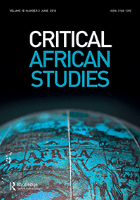
Critical African Studies
Fostering Dialogue on Social Justice and GovernanceCritical African Studies, published by TAYLOR & FRANCIS LTD, is a premier journal dedicated to advancing the discourse on critical issues affecting Africa and its diaspora. With an ISSN of 2168-1392 and an E-ISSN of 2040-7211, this journal has established itself as a leading publication in the field of Arts and Humanities, ranked Q1 in Arts and Humanities (miscellaneous) and Q2 in Social Sciences (miscellaneous) as of 2023, showcasing its commitment to high-quality research. Over its converged years from 2015 to 2024, it has become a critical platform for scholars and practitioners to explore diverse perspectives, innovative ideas, and multidisciplinary approaches to issues such as social justice, governance, and cultural narratives within the African context. The journal's Scopus rankings reflect its significant impact, with impressive placements in both the Arts and Humanities and Social Sciences categories. Critical African Studies aims to foster a robust dialogue among researchers, professionals, and students, making it essential reading for anyone interested in the complexities of Africa's socio-political landscape and cultural heritage.

SCHWEIZERISCHES ARCHIV FUR VOLKSKUNDE
Connecting Scholars to the Heart of Cultural StudiesSCHWEIZERISCHES ARCHIV FUR VOLKSKUNDE, with ISSN 0036-794X, is a vital resource for scholars and practitioners in the fields of Arts and Humanities and Cultural Studies. Published by G KREBS VERLAGSBUCHHANDLUNG AG in Switzerland, this journal plays a crucial role in advancing the discourse surrounding folk culture, traditions, and anthropology. Despite its current ranking in the Q4 category for both Arts and Humanities and Cultural Studies, the journal serves as an essential platform for disseminating unique research findings and insights, contributing to a well-rounded understanding of diverse cultural practices. Researchers, professionals, and students are encouraged to explore the rich content produced between 2008 and 2014, and from 2017 to 2023, which reflects a commitment to fostering a multidisciplinary approach to folklore studies. By addressing the complexities of cultural dynamics, the journal not only promotes scholarly engagement but also enriches the academic community’s appreciation of folk traditions.
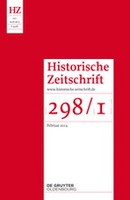
Historische Zeitschrift
Pioneering Insights into the Evolution of SocietyHistorische Zeitschrift is a prestigious academic journal dedicated to the field of history, published by WALTER DE GRUYTER GMBH. Established in 1859, the journal has a long-standing legacy of promoting scholarly discourse and research that spans pivotal eras from the 19th century to contemporary times. With an ISSN of 0018-2613 and an E-ISSN of 2196-680X, it is well-recognized in the academic community for its rigorous standards and contributions to historical scholarship. This journal is currently positioned in Quartile 3 of its category for 2023 and holds a respectable rank of #762 out of 1760 in Scopus, placing it in the 56th percentile for Arts and Humanities – History. Though not available in an open access format, Historische Zeitschrift continues to attract submissions from both emerging and established historians eager to contribute to an understanding of historical contexts and narratives. Its scope includes extensive historical analysis, discussions on methodology, and explorations of sources, making it an invaluable resource for researchers, professionals, and students alike who seek to deepen their insights into historical developments.
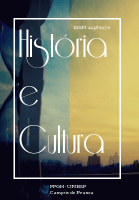
Historia e Cultura
Connecting Cultures: A Gateway to Historical InsightsHistoria e Cultura is a distinguished open-access journal focusing on the dynamic and multifaceted exploration of history and culture within the context of the Humanities. Published by the UNIV ESTADUAL PAULISTA JULIO MESQUITA FILHO, FAC CIENCIAS HUMANAS & SOCIAIS, the journal serves as a vital resource for researchers, professionals, and students engaged in the fields of historical research and cultural studies. Since transitioning to open access in 2012, Historia e Cultura aims to democratize knowledge by providing free, unrestricted access to high-quality articles that foster scholarly exchange and innovation. Although the specific impact factor remains undisclosed, the journal is dedicated to contributing to the academic discourse through rigorous peer-reviewed research. Situated in Brazil, Historia e Cultura is well-positioned to address both local and global issues, encouraging critical engagement with cultural heritage and identity. Researchers and scholars are invited to submit their work, ensuring that diverse perspectives are represented in the study of our shared history.
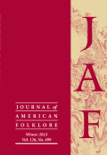
JOURNAL OF AMERICAN FOLKLORE
Advancing the Dialogue on Folklore and SocietyJOURNAL OF AMERICAN FOLKLORE, published by the American Folklore Society, is a distinguished journal dedicated to the exploration and analysis of folklore, cultural traditions, and the diverse narratives that shape American identity. With a rich history dating back to its inception, the journal has positioned itself as a leading platform in the field, boasting a 2023 ranking of Q1 in Cultural Studies and Q2 in Arts and Humanities (miscellaneous). The journal's impact within the academic community is underscored by its high Scopus rankings, placing it in the 83rd and 65th percentiles in Cultural Studies and Arts and Humanities, respectively. Readers can access a wealth of insightful articles that contribute to ongoing discussions in folklore studies, cultural anthropology, and related disciplines. As the study of folklore becomes increasingly relevant in understanding contemporary societal dynamics, JOURNAL OF AMERICAN FOLKLORE serves as an essential resource for researchers, professionals, and students alike, enriching discourse and fostering a deeper appreciation for the cultural experiences that define America.
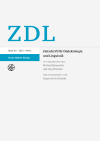
ZEITSCHRIFT FUR DIALEKTOLOGIE UND LINGUISTIK
Bridging Cultures Through Language Insights.ZEITSCHRIFT FUR DIALEKTOLOGIE UND LINGUISTIK, published by FRANZ STEINER VERLAG GMBH, is a distinguished academic journal based in Germany that occupies a vital place in the field of linguistics and dialectology. With an ISSN of 0044-1449 and an E-ISSN of 2366-2395, this journal has evolved significantly from 2003 to 2024. It is recognized in the 2023 Journal Rankings as Q2 in Linguistics and Language, and Q3 in Sociology and Political Science, reflecting its dual focus and interdisciplinary approach. Academics will appreciate its commitment to exploring the nuances of language and its social implications, as evidenced by its respectable Scopus rankings, placing it in the 61st and 57th percentiles for Language and Linguistics, and Sociology respectively. While the journal is not open access, it remains a critical resource for researchers, professionals, and students seeking to deepen their understanding of dialectal variations and their cultural contexts. Positioned to foster ongoing dialogue and inquiry, ZEITSCHRIFT FUR DIALEKTOLOGIE UND LINGUISTIK continues to be an indispensable outlet for scholarly work in these interdisciplinary fields.

MERKUR-DEUTSCHE ZEITSCHRIFT FUR EUROPAISCHES DENKEN
Advancing Critical Discourse in Arts and HumanitiesMERKUR-DEUTSCHE ZEITSCHRIFT FUR EUROPAISCHES DENKEN is a prestigious journal published by Klett-Cotta Verlag, dedicated to the exploration of European thought, culture, and intellectual discourse. With an ISSN of 0026-0096, this journal provides a platform for critical analysis and reflection on a wide array of topics within the fields of Arts and Humanities, Cultural Studies, and Sociology. Although coverage in Scopus was discontinued in 2014, MERKUR maintains a significant historical footprint, having previously ranked #76 in Arts and Humanities and #519 in Cultural Studies. This underscores its role in contributing to scholarly conversations regarding European intellectual traditions. The journal, located at Rotebühlstraße 77, D-7004 9 Stuttgart 1, Germany, while not open access, remains an essential resource for researchers, professionals, and students alike, keen on examining the contours of European thinking and its implications in contemporary society.
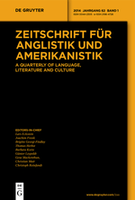
ZEITSCHRIFT FUR ANGLISTIK UND AMERIKANISTIK
Pioneering Insights in English and American ScholarshipZEITSCHRIFT FUR ANGLISTIK UND AMERIKANISTIK is a distinguished academic journal dedicated to the fields of English studies and American studies, published by Walter de Gruyter GmbH. Nestled in Germany, the journal has carved a niche for itself since its inception, offering a vital platform for scholars interested in the nuances of linguistics, literature, and cultural studies. Although it currently operates without an open access model, its rich repository of research is invaluable for those keen to explore the historical and contemporary intersections of English and American literature. With an ongoing commitment to publishing high-quality, peer-reviewed articles, the journal has garnered attention in Scopus rankings, receiving recognition in both the Q3 and Q4 quartiles for literature and linguistic studies respectively. As a hub for innovative research, ZEITSCHRIFT FUR ANGLISTIK UND AMERIKANISTIK encourages robust dialogue and scholarly exploration, making it an essential resource for researchers, professionals, and students alike in the ever-evolving landscape of linguistic and literary theory.

OSTERREICHISCHE ZEITSCHRIFT FUR VOLKSKUNDE
Advancing the Study of Social Practices and TraditionsOSTERREICHISCHE ZEITSCHRIFT FUR VOLKSKUNDE is a dedicated academic journal published by the VEREIN FUR VOLKSKUNDE that focuses on the interdisciplinary study of folklore and ethnology, particularly in the Austrian context. With a long-standing history of contributing to cultural studies, this journal serves as an essential resource for researchers, professionals, and students interested in the nuances of social practices, traditions, and cultural narratives. Although it has ceased its indexing in Scopus as of 2019, its impact is reflected in its rankings, particularly in the categories of Social Sciences and Arts and Humanities, making it a crucial reference point for those studying cultural phenomena. The journal, with ISSN 0029-9669, is based in Vienna, Austria, and offers a rich compendium of articles that promote scholarly discourse and broaden understanding in the field of Volkskunde. As it continues to foster academic dialogue, OSTERREICHISCHE ZEITSCHRIFT FUR VOLKSKUNDE remains a notable contributor to the evolution of cultural studies in the region and beyond.
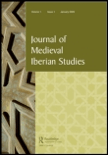
Journal of Medieval Iberian Studies
Connecting Cultures Through Medieval ScholarshipThe Journal of Medieval Iberian Studies is a leading academic journal published by Routledge Journals, Taylor & Francis Ltd, dedicated to exploring the diverse and rich tapestry of medieval Iberian history and culture. With its ISSN 1754-6559 and E-ISSN 1754-6567, this journal serves as a vital resource for scholars engaged in the fields of cultural studies and history, attaining a prestigious Q1 ranking in both categories as of 2023. The journal is recognized for its significant contribution to the humanities, featuring peer-reviewed articles that foster innovative research and critical discourse on medieval Iberia from 2010 to 2024. Spanning an array of topics, it encapsulates interdisciplinary approaches to medieval studies, making it an essential publication for researchers, professionals, and students alike who seek to deepen their understanding of this pivotal period in history. Although it currently does not offer open access options, the journal is committed to advancing scholarly discussion and knowledge dissemination within the academic community.